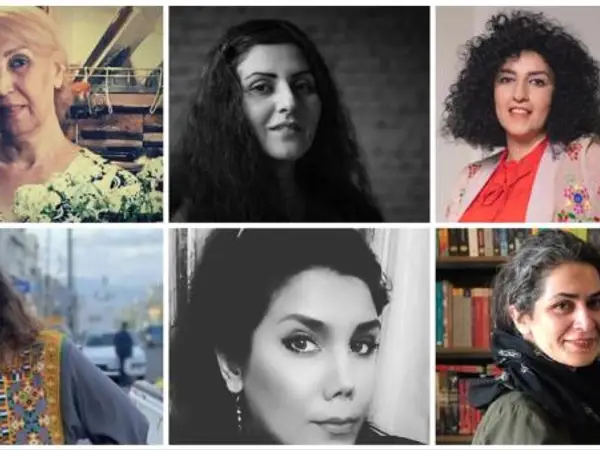A group of female political prisoners in Tehran’s Evin Prison staged a sit-in to protest recent executions, saying the regime wants to frighten people into submission.
“The regime is taking revenge for the revolutionary movement by executing and killing people,” human rights activist Narges Mohammadi told inmates who gathered Saturday evening at the courtyard of the women’s ward to protest the execution of three political prisoners in Esfahan Friday.
Mohammadi argued that unlike the 1980s when the regime executed thousands of political prisoners to establish and stabilize its tyranny, the recent executions will only strengthen the people’s determination to overthrow the Islamic Republic.
Majid Kazemi, Saeed Yaghoubi and Saleh Mirhashemi were handed down the death sentence in a trial condemned as a travesty of justice by human rights campaigners, who say the prisoners were tortured into confessions, and there is no reliable evidence against them.
The three men were convicted over the death of two IRGC’s Basij militia members and a police officer during protests last November in Esfahan. Leaked audio from police radio chatter from the night the three regime agents were killed indicates that they were shot by friendly fire of plainclothes forces. The accused even had alibis for the time the agents were killed, with the family of one of the victims claiming there was CCTV video footage of their son at work.
Friday's executions brought to at least seven the number of protesters hanged since the beginning of the nationwide protests last September, which turned into one of the boldest challenges to the clerical rulers since the 1979 revolution. The protests were ignited by Mahsa Amini's death in the custody of Iran's morality police.
“Execution and taking people’s lives has turned into a despicable everyday practice in the Islamic Republic,” Faezeh Hashemi, the daughter of former President Akbar Hashemi-Rafsanjani said at the same gathering. “Execution of three protesters in Esfahan [last week], two in Tehran [in December], executions of 209 in five months, 580 in one year, 14 executions in one day, 22 executions in two weeks…,” she went on to say.
Hashemi accused the regime of using executions to “shut the mouths of critics and dissidents and to escape accountability over the appalling situation in the country” and it also signals the regime’s fear of the people.
She denounced executions “under any pretext, including for impertinence against the prophet, insult against sanctities, taking up arms against the regime, blasphemy, corruption on earth and even for drug trafficking” because, she said, “justice has been taken to the slaughterhouse”.
Hashemi, a former lawmaker who launched Zan daily for women during the presidency of reformist President Mohammad Khatami in late 1990s, is an outspoken critic of Supreme Leader Ali Khamenei.
Activists and politicians at home and abroad, as well as family members of protesters killed by the regime have extensively condemned the recent executions. Several neighborhoods in the capital Tehran, Esfahan and in a few other cities were scenes of protests against the regime’s executions last week. Students at universities across Iran also staged demonstrations.
Over 170 activists and politicians in Iran in a joint statement released Sunday dubbed the executions a “systematic murder by the government and demanded the immediate annulment of all death sentences.
A group of political prisoners including reformist politician Mostafa Tajzadeh, also an outspoken critic of Khamenei, said in a separate statement that the regime is using executions “as a tool of suppression and to cover up political, economic and social challenges and crises.”
Friday’s executions also sparked outrage among Western governments and people around the world.
